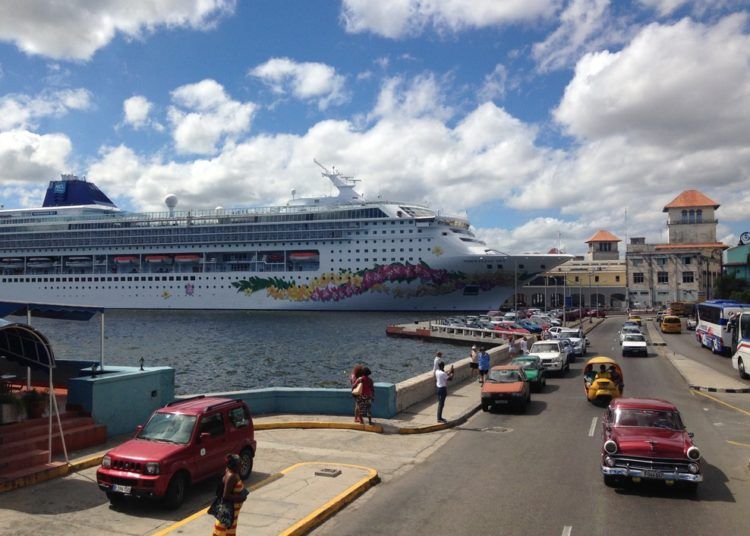– January: The Obama administration and Cuba sign the last bilateral agreements before the arrival of Donald Trump to the White House, on topics like the protection of the environment, commercial exchange and the demarcation of its borders in the Gulf of Mexico.
– January 12: President Barack Obama puts an end to the “wet foot/dry foot” policy and the Parole program for Cuban doctors on missions outside the island.
– February 2-4: Colorado Governor John Hickenlooper’s visit to Cuba is the first by a high-ranking U.S. politician during the presidency of Donald Trump.
– February 3: White House spokesman Sean Spicer announces that President Trump ordered a “complete revision” of U.S. policy toward Cuba.
– February 19-22: First visit to Cuba by a delegation of U.S. congresspeople during Trump’s presidency. The group was made up by senators Patrick Leahy (D-Vermont), Tom Udall (D-New Mexico), and Michael Bennet (D-Colorado), Senator William Thad Cochran (R-Mississippi), and Representative Jim McGovern (Massachusetts).
– February 20: Signing of two memorandums of understanding between the Cuban government and the ports of Pascagoula and Gulfport, in the south of the United States.
– March 7: A delegation of Republican congresspeople meets in Havana with Cuban Foreign Minister Bruno Rodríguez Parrilla. The delegation was made up by representatives Tom Emmer and Jason Lewis (Minnesota), Roger Marshall (Kansas), James Comer (Kentucky) and Jack Bergman (Michigan).
– April 19: During a visit to the island, Mississippi Governor Phil Bryant asks the Cuban and U.S. governments to continue bilateral talks.
– May: It is announced that up to the close of the month a number of Americans similar to that of 2016 has visited Cuba.
– May 25: The Freedom to Travel to Cuba Bill is presented in the Senate with the backing of a bipartisan coalition made up by 55 members of the Senate.
– May 27: The Freedom to Export to Cuba Bill is presented in the Senate with the backing of a bipartisan coalition.
– June 16: President Trump announces in Miami changes in the policy toward Cuba, which include restrictions to the trips to the island by Americans and doing business with Cuban enterprises.
– June 20: Minnesota Lieutenant Governor Tina Smith is the first U.S. high-ranking figure to visit Cuba after Trump’s announcements in Miami.
– July 7: Scott Hamilton assumes the post of acting chargé d’affaires of the U.S. Embassy in Havana, replacing Jeffrey DeLaurentis, who headed the embassy since its opening in 2015.
– August 1: Senator Ron Wyden (D-Oregon) presents in the Senate the Trade with Cuba Bill.
– August 2: The Port Authority of Houston and the Cuban Maritime Administration sign in Havana the first bilateral agreement at this level since President Trump’s June announcements.
– August: Alleged acoustic attacks against U.S. diplomats in Havana come to light. The administration sets at 16 the number of those affected. The Cuban government denies any responsibility in the incidents. Tensions increase.
– September 16: U.S. and Cuban officials hold talks in Washington about the “acoustic attacks,” the U.S. fugitives living on the island and the situation of the Cubans with deportation orders in the United States.
– September 19: President Trump gives a speech at the UN in which, among other topics, he harshly criticizes the Cuban government and conditions relations with the island to the application of “fundamental reforms.”
– September 20: The sixth meeting of the U.S.-Cuba Bilateral Commission is held, the first in 2017. The Cuban side protests President Trump’s speech at the UN.
– September 26: Cuban Foreign Minister Bruno Rodríguez and U.S. Secretary of State Rex Tillerson hold talks in Washington about the alleged acoustic attacks.
– September 29: The U.S. government orders the withdrawal of more than half of its diplomats in Havana and suspends indefinitely the issuing of visas to Cuban citizens on the island.
– October 3: The United States expels 15 Cuban diplomats in Washington, in response to the alleged acoustic attacks, and raises to 22 the number of affected Americans.
– October 3: In a press conference the Cuban foreign minister says that “there isn’t a trace of evidence” about the acoustic attacks and regrets the lack of collaboration by the United States to investigate the incidents.
– October 5: It is notified that the Cubans who wish to request non-immigrant visas to the United States must do so in third countries. The measure includes those who had already initiated the application and paid the rate of 160 USD.
– October 6: The Port Authority of Cleveland and the Cuban Maritime Administration sign a memorandum of understanding in Havana to promote commercial relations between the state of Ohio and Cuba.
– October 13: It is notified that the Cubans who wish to request a visa to immigrate to the United States must do so in the U.S. Embassy in Colombia.
– October 14-17: Visit to Cuba by a delegation of the U.S. city halls of Tampa and Saint Petersburg, Florida, the first in the midst of the diplomatic crisis caused by the alleged acoustic attacks.
– October 18: A replica of the equestrian sculpture of José Martí in Central Park, New York, is placed in Old Havana. Its official inauguration is previewed for January 28, 2018.
– October 26: Cuba presents in a documentary the preliminary results of its investigation about the “acoustic attacks”. It concludes that it has not found evidence that corroborates the alleged incidents.
– October 28: The Cuban foreign minister announces in Washington a package of migration measures directed at Cubans residing abroad, which will take effect on January 1, 2018.
– October 30 to November 3: A dozen U.S. companies and entities participate in the 35th Havana International Trade Fair, a rollback from the close to 40 from the previous edition.
– October: More than 544,000 Americans visited Cuba up to the close of this month.
– November 2: The Cuban foreign minister states in a press conference in Washington that “no attack has taken place” against Americans in Havana and denies any responsibility by the island’s government.
– November 9: The travel to Cuba restrictions and prohibition to do business with some of the island’s enterprises, announced in June by President Donald Trump, come into force. Reactions in and outside the island.
– November 28: The magazine Science reveals the effects of the policy toward Cuba of the Trump administration on scientific exchange between the island and the United States.
– December 5: According to the media, the government of Donald Trump names Philip Goldberg as chargé d’affaires of the U.S. Embassy in Havana. His appointment has still not been made official.
– December 11: A new round of migratory talks between Cuba and the United States is held in Washington. The Cuban delegation expresses “its deepest concern” over the Trump administration’s recent measures against the island.
– December 16: Harvard University (Massachusetts) and the Cuban Ministry of Higher Education sign collaboration agreements in scientific researches and for the promotion of joint publications.
– December 22: The Office of the U.S. Citizenship and Immigration Service (USCIS) updated its policy to determine the Cuban citizenship and thus obtain permanent residency in the United States to the effects of the Cuban Adjustment Act.









